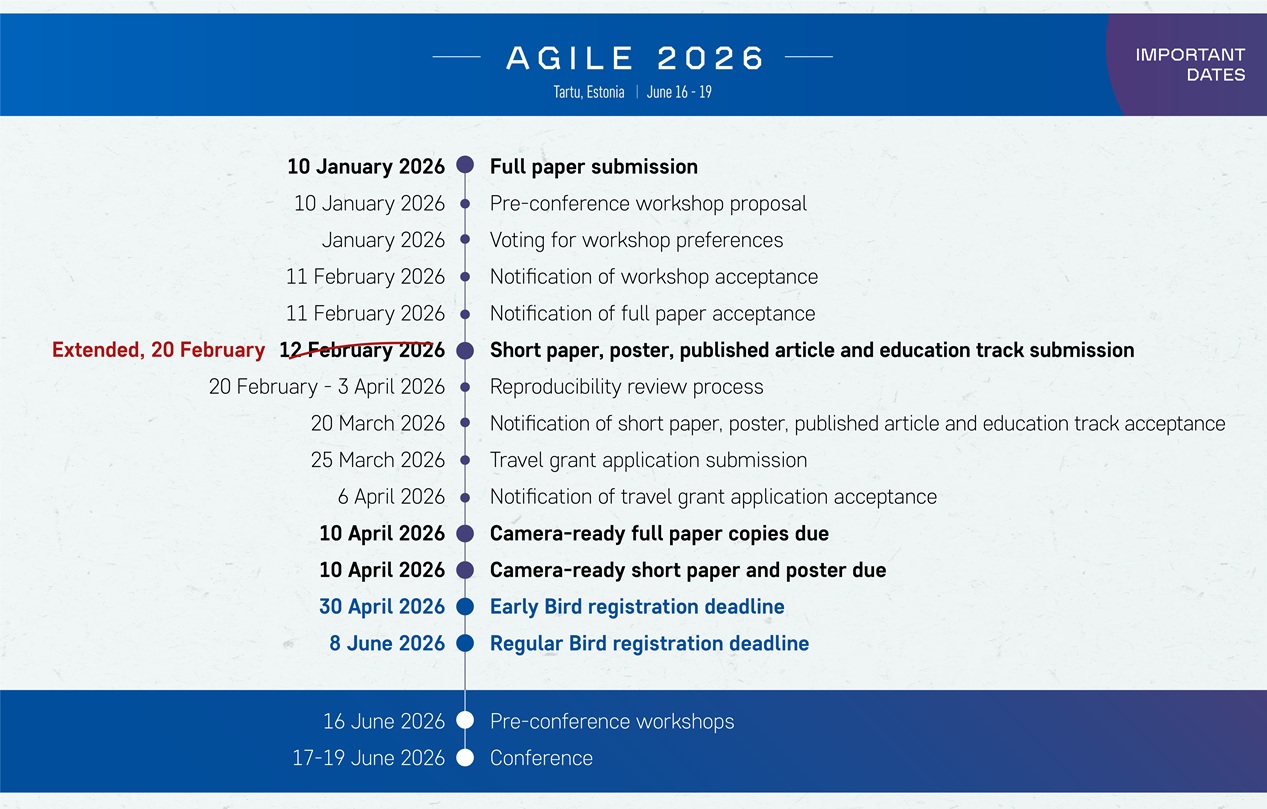Call for papers for the 29th AGILE conference, Smart Data: Making Geospatial Data Actionable, Tartu, Estonia on 16 - 19 June 2026
Since 1998, the Association of Geographic Information Laboratories in Europe (AGILE) has been hosting annual conferences dedicated to Geographic Information Science. The upcoming AGILE 2026 conference will take place in Tartu, Estonia, from June 16 to 19, 2026.
The AGILE 2026 conference theme “Smart Data: Making geospatial data actionable” stresses the need to transform vast amounts of geospatial information into useful knowledge that can drive decision-making and solve real-world problems effectively.
We cordially invite researchers, practitioners, and professionals in all facets of Geographic Information Science and Technology and their applications to present ongoing research, showcase products, network with colleagues from Europe and the rest of the world, and find out about the latest developments in the field.
Topics of interest for submissions include, but are not limited to:
- Spatial Statistics and Geostatistics
- Visualisation of geospatial data
- Spatial Data Ecosystems
- Spatial Databases and Data Management
- Using remote sensing data in geospatial analysis and applications
- Web-based GI Systems and Services
- XR: Virtual, Augmented, Mixed Reality (VR, AR, MR)
- Data fusion and uncertainty reduction
- Semantic enrichment, ontologies, and knowledge graphs
- AI/ML approaches for geospatial analysis and reasoning
- FAIR principles, open data, and reproducibility
- Human-centered and participatory approaches to geospatial knowledge creation
- Applications: climate resilience, energy transition, health, urban futures etc.
The 29th AGILE conference will have oral presentation sessions, three keynote sessions, a poster session, a best paper, a best reproducibility report and a best poster, as well as pre-conference workshops. Similar to 2025, we will run a published article session, showcasing presentations of articles already published in journals. At AGILE 2026, we are introducing our first education track, where educators and researchers can share their contributions and engage in exchanging ideas and best practices for teaching geoinformatics.
Information regarding registration and fees is shared on the respective page.
Important dates

Submissions
Full-paper track - Submissions closed!
4000 to 6000-word manuscripts of original and unpublished fundamental scientific research. High-quality scientific submissions will be accepted for presentation at the conference and published open-access in the AGILE: GIScience Series of Copernicus Publishers, indexed in ADS, Gale, GeoRef, Google Scholar, J-Gate, OAinONE, ProQuest, World Public Library.
Short-paper track - deadline 12 February 2026
2000 to 3000-word manuscripts of original and unpublished research work. High-quality scientific and strategic (industrial and governmental) submissions will be accepted for presentation at the conference and published open-access in the AGILE: GIScience Series of Copernicus Publishers, indexed in ADS, Gale, GeoRef, Google Scholar, J-Gate, OAinONE, ProQuest, World Public Library.
Published article track - deadline 12 February 2026
300 to 500-word summary of articles published during the years 2024-2026 in a peer-reviewed scientific journal. Submissions should include a citation with a link to the published article.
Poster track - deadline 12 February 2026
500 to 1000-word extended abstract of original scientific and strategic research work (please use the same template as full and short papers). Posters provide a good opportunity to stimulate scientific discussions and exchange novel ideas.
Education track - NEW! - deadline 12 February 2026
500 to 1000-word extended abstract on novel approaches in geoinformatics education. At AGILE 2026, we are introducing our first education track, where educators and researchers can share their contributions and engage in exchanging ideas and best practices for teaching geoinformatics.
Submission guidelines
The submission of papers is via EasyChair platform.
Full and short papers and posters must be prepared using either the Word Document template or the LaTeX Document template. Education track submissions follow the extended abstract template. Papers must be written in English according to the formatting guidelines. Authors must remove their names and institutional details from the title, header, and acknowledgements as AGILE 2026 is running a double-blind review process. Self-citations must be cited in the third person, such as replacing “As described in our previous work [10]...” with “As described by (Author Name) [10]...”. Further suppression of identity in the body of the paper is left to the authors’ discretion.
Reproducibility
All paper submissions must follow the AGILE Reproducible Paper Guidelines. The accepted paper must have a section describing the data and software availability. Papers that lack a data and software availability section will be rejected immediately and without review. More information on this section may be found in the templates.
The reproducibility chair invites all members of the AGILE community, but especially early career researchers, to self-nominate for the reproducibility committee. Please contact Daniel Nüst (daniel [dot] nuest [at] tu-dresden [dot] de) if you are interested in contributing to increasing transparency, reproducibility and reusability of GIScience research. See the Reproducible AGILE website for more information.
Submission type
When preparing a submission to the AGILE 2026 conference, we ask authors to add metadata to their submission. One new metadata field is called a submission type. Please choose all applicable types from the list below and add them / copy them into your submission after the term "Submission type." below the abstract. Your decision as to the type should be guided by the main contribution of the paper. Your paper might focus on the following content:
- theory
- model
- analysis
- dataset
- algorithm
- software
- project
- case study
- infrastructure
- other (please specify)
As an example: A paper describes the development of an ontology within the context of a project using a case study and collects data as proof of concept. With a focus on the description of the ontology, it could be classified as a "model". If the focus is rather on collecting the data as a basis for the ontology, then it might be classified as a "dataset". It is not a type of "project" since this is not the focus of the paper.
For any inquiries, please contact:



